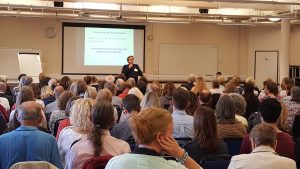Jacqui Wolff – CCET
Jacqui Wolff completed the Certificate of Competence in Educational Testing course with us.
Here, she talks a little bit more about her experience studying!
What do you do?
I’m a dyslexia specialist and work in a mainstream college with 5,000 students and 400 staff.
Why did you decide to study the Certificate of Competence in Educational Testing (CCET) with us?
I wanted to enhance my existing testing skills and a psychologist at my college recommended Real Training.
What was your favourite part of the course?
I liked the individual attention and the quick response actually. Whenever I had a question or something wasn’t clear, I would get an immediate response to help me progress. Most of this was online with a few days’ face-to-face.
What impact has it had on your professional life?
It has clearly improved my report writing, the way of looking at different results when you’re assessing – all of that was very well explained and tweaked by the excellent teachers.
What can someone who has taken these modules offer?
They will really be able to write reports, assess and test.
Why would you advise someone to take this course?
It’s essential if you want to get the best out of your assessments and testing.
Annali Bell – NASENCO
Annali Bell studied the National Award for SEN Coordination with us at Real Training.
Find out more about her experience!
What made you choose the Real Training course(s) over other options?
I was keen to complete an online course as I have a toddler at home who keeps me very busy. I wanted something that would fit in with working part time and looking after my daughter so this seemed like the perfect option to me.
I also liked the idea of being able to complete tasks in my own time and at my own rate, meaning I could make the most effective use of my time, including nap times and evenings! When researching possible courses, I was interested in the different modules and was encouraged by the fact I would not be required to attend a university campus as I thought this may be quite tying.
What was your experience of learning with Real Training?
I have received brilliant tutoring from Joan. She always responds to emails quickly and in detail and is always happy to help and offer suggestions. I really appreciate all the support I have received! Thank you! I enjoyed taking part in a placement as that gave me strong links with other local SENCos. I also found the reviewing of provision within my setting to be extremely useful and beneficial.
I have been really happy with the quality of the programme. I have felt it all to be relevant to my role in school and I have enjoyed learning more about the various requirements of a SENCo. I have had a very positive experience with this course. I have been able to fit this around working part time and looking after my toddler. I have enjoyed developing my own understanding and feel very lucky to have been able to do so at my own pace and from the comfort of my own home.
Thank you!! It’s been a long journey and I’ve finally reached this end…I hope to take additional courses in the future as I have really enjoyed completing this one (more so than I anticipated), but for now…rest!
How has the course(s) helped make an impact at school?
I have reviewed provision in detail as a result of the tasks in this course. I have also increased in confidence and feel more confident when speaking with staff about their roles which has resulted in more effective provision and outcomes for the children, especially those on passports (IEPs).
I increased the amount of support for children with SEMH needs following one of the assignments. I am keen to monitor and track the provision as the course has shown me that this is a key role in assessing the effectiveness of an intervention.
How has the course(s) helped develop you as an educational professional and what do you hope to achieve with the new knowledge/skills in the future?
Creating links with another local school (placement task)
Increased confidence with own abilities and knowledge
Increased understanding of leadership responsibilities which has in-turn increased confidence too
I have an increased awareness of the role of SENCo and am much more confident in delegating roles and ensuring staff are completing their roles effectively.
Melissa Skiles – CPT3A
Melissa Skiles studied the Certificate in Psychometric Testing, Assessment and Access Arrangements.
Here, she talks a little bit more about her experience studying the course and how it has benefited her.
Why did you decide to study with us?
As Head of Inclusion for an international British curriculum school in Dubai, the education and qualification provided by completing this course will help improve provision and support in the ever-changing and progressive private educational sector I work in.
What was your experience of learning with Real Training?
The course has exceeded my expectations – both in person and the online modules. Throughout the duration of the course, the instructors have consistently proven themselves as consummate professionals but warm in their approach. They have also consistently demonstrated expertise and extensive knowledge of the content and its importance in the realm of education; they do so in a manner that is thoughtful and supportive. They organised varied content with real-world application and taught us the intricacies of such ethical work and practices and how to maintain those high standards.
How has the course(s) helped make an impact at school?
In a sector that is continuously evolving, it is imperative to stay on the proverbial edge of new assessment and understanding of the unavoidable biases within it, which this course helps us to understand, analyse, breakdown, and ultimately for the better of our students, avoid.
My school’s headteacher was excited for me to pursue this course as she knew the benefits for our students would be long-lasting and imperative to their accessibility in GCSEs.
How has the course(s) helped develop you as an educational professional and what do you hope to achieve with the new knowledge/skills in the future?
This is the first course since achieving my professional special education licensure (degree) that has had such a far-reaching impact on my career. It is the bridge between the information I have learned to access and sharing that information appropriately, responsibly, and in an ethical manner that meets high professional standards.
Claire Lenaghan – NASENCO
Claire Lenaghan has studied the National Award for SEN Coordination with us. Here she talks a little bit more about her experience.
Why did you decide to study the National Award for SEN Coordination (NASENCO) with us?
Real Training was recommended to me by a colleague, I researched other providers but preferred the Real Training platform and I had previously studied with Middlesex University.
What was your experience of learning with Real Training?
I love the Campus Online platform and my tutor was fantastic – he was very supportive and gave me lots of encouragement along the way.
Strands 1 and 2 were very useful, however, I enjoyed Strand 3 the most. I loved completing the Masters assignment in Strand 3 – the topic is something I feel passionately about and it was therefore a task I really enjoyed.
How has the course(s) helped make an impact at school?
Changes I have implemented in the department have already seen impact with student engagement and behaviour.
I also introduced a number of interventions during the course and we have some new assessment tools for next term. Over the course of Strand 2 I identified that SEMH was an area that the school that needed to provide more provision for and this year I have trained one of the SEND team to lead the department on supporting for our students with SEMH issues. Following discussions with other delegates from the National Award for SEN Coordination with Real Training, my department is now also running The Boxall Profile to assess our students with social, emotional and behavioural difficulties.
How has the course(s) helped develop you as an educational professional and what do you hope to achieve with the new knowledge/skills in the future?
I was very concerned at the start of the course as I had not completed any formal assignments for a number of years and had concerns I would struggle with the Masters level writing.
I now feel more confident regarding SEND but also in my ability to study and succeed in further Masters level modules/courses. I am now looking forward to starting my next Real Training course the National Professional Qualification for Senior Leadership (NPQSL).
We have heard from the Department for Education (DfE) that funded places will be available for all our NPQ courses from 1 April 2020 until the end of the current academic year.
Funded places for all NPQ courses are available for leaders and aspiring leaders in:
- Maintained schools, academies, free schools and PRUs in category 5 and 6 areas
- All schools in a MAT which includes at least one category 5 or 6 school
- All schools in a Diocese which includes at least one category 5 or 6 school
Whether you’re thinking of taking the next step in your career or simply looking to develop your leadership skills in your current role, our online and inclusive National Professional Qualifications (NPQ’s) offer you a flexible route to achieve these high-quality qualifications approved by the Department for Education (DfE). Book now to secure your fully-funded place.
Please note: Places within a school, cluster, MAT or Diocese are not limited – so if you have colleagues who you think may also be interested, please don’t hesitate in forwarding this information to them.
Our NPQ courses are available at three school leadership levels – middle leaders (NPQML), senior leaders (NPQSL) and headship (NPQH) – please take a look at our dedicated pages online for more information on programme content, funding rules and what you can expect from our leading-edge, inclusive leadership programmes. If you have any questions, please call us on +44 (0)1273 35 80 80 to speak to one of our expert advisers or email us here.
In a newly released report from the Education Policy Institute (EPI), commissioned by the Wellcome Foundation, continuing professional development (CPD), which includes training courses, mentoring and seminars has been found to play a crucial role in improving teaching quality, and the learning outcomes of pupils.
The report also goes on to demonstrate the positive effects on teacher retention, as well as how access to professional development for teachers has improved.

The impact of professional development on pupils
According to the report, CPD programmes “have the potential to close the gap between beginner and more experienced teachers”; the impact of CPD for a newly-qualified teacher on pupil outcomes is comparable to the impact of a teacher with ten year’s experience. The effect of CPD was also found to have similar attainment improvements as large, structural reforms to the school system.
In addition, the evidence suggests that CPD has a greater effect on pupil attainment than other interventions that might be considered by schools, such as performance-related pay for teachers or lengthening the school day. CPD is also relatively cost-effective; although one-to-one tutoring was found to impact pupil attainment to a higher degree, these can be very expensive, both financially and in terms of time.
Perhaps most tellingly, though, was that CPD programmes were more positively received by teachers when compared to other interventions, such as large structural changes to the school system. These can be expensive and cause higher staff turnover and dissatisfaction.
The impact of professional development on teacher retention
With an increase in high-quality CPD, retention problems improve, particularly for newly-qualified and early-career teachers. While it is understood that access to CPD is only one of many factors behind the number of teachers leaving the profession, targeted CPD programmes for teachers in the early stages of their careers can increase retention rate and instil an atmosphere of positivity and future ambition within them. Induction training and mentoring programmes are particularly effective for improving retention rates early on.
Improving access to professional development for teachers
It doesn’t seem that simply throwing CPD opportunities at teachers is sufficient, however. “Teacher turnover is a major impediment to the effectiveness of a CPD programme” the report states, suggesting that courses that offer flexibility, in terms of cohort start dates, deadlines and so on are more likely to be successful. Furthermore, when the CPD programme receives sustained support from school leaders, it is found to have a greater impact on pupil attainment. Finally, understanding the high workload of teachers can make them more effective – “interventions are likely to see success if they are both attractive and strive to minimise the demands placed on teachers.”
Real Training – high-quality, flexible and effective professional development
This report supports what we at Real Training have long-believed to be the case; that providing professional development courses of the highest-quality, delivered flexibly through Campus Online leads to significant positive effects on pupil’s learning outcomes, across the full range of special educational needs. We understand that teachers are under a vast amount of pressure and have wildly varying workloads, which is why we allow you to work at your own pace and in your own time, from anywhere you have access to the internet. Our courses start at multiple points throughout the year, giving you the option to begin your journey when it suits you best.
Our courses and qualifications cover a vast array of SEND and leadership topics and include our
- Masters of Education in SEND (MEd SEND)
- National Award for SEN Co-ordination (NASENCO)
- National Professional Qualifications (NPQs)
- Masters in Leadership in Inclusive Practice (MALIE)
You can download the full report here.
When you have decided which cohort works best for you or your colleagues, please complete our simple online booking form. If you have any questions regarding our NPQ courses, please get in touch with us here.

Feedback from our delegates is very important to us. This is why we ask every delegate to complete a feedback form upon completion of their course. This provides us with extremely valuable data on what we’re doing right, and what we can improve upon.
We’ve been carefully analysing the data from over 1,000 delegates in 2019, and below are highlights of the results.
- 96% of delegates rated our course as good or very good.
- 97% of delegates rated the extent to which their course met their developmental priorities as good or very good.
- 93% of delegates rated the course tutors as good or very good.
- 93% of delegates rated their experience of the course administration from Real Training as good or very good.
- All metrics have improved year-on-year from 2018 to 2019, reflecting how we strive to improve, always.
Nearly 3/4 of our delegates report that they are considering studying further modules with us.
Some comments from our delegates
“An amazing course. I loved how accessible it was. I could work in the evenings/ weekends/ holidays etc. It fitted around my workload easily as there are no formal deadlines apart from the one a year on from when you start. As everyone’s workloads are different this is ideal. There were no university visits so no time off of work. The website was easy to use and navigate around. My Tutor was fantastic, and always available for support. I would really recommend booking a course with Real Training.” – Sarah Phillips, NASENCO
“It is an excellent organisation which will help you advance in terms of your personal development, knowledge and understanding whilst providing all the support you may require, want or need.” – Daniel Smith, AAC Online
“I have recommended Real training to several colleagues from the North east who are in the process of completing this accreditation.” – Dawn Ablewhite, CCET Intensive
“The tutoring I have received through Real Training has been far superior to that during my undergraduate degree or masters both of which were face to face not distance learning. My tutor has been encouraging and supportive throughout and offered really clear feedback. Overall it has been brilliant! With the support of my tutor I have had everything I needed to complete this course. I loved how easy everything was and how varied the online journals etc there were for you to access. It was also so lovely to have an online community. It’s a brilliant way to complete the task especially if you’re a parent. Very supportive tutors and community.” – Ella Browning, NASENCO
If you are thinking of enrolling on a course with us, either for the first time or a returning delegate, please don’t hesitate to get in touch with us on +44 (0)1273 35 80 80 or contact us here.
This week is the UK Children’s Mental Health Week.
Set up by children’s mental health charity Place2Be, UK Children’s Mental Health Week aims to bring to the national attention the importance of children and young people’s mental health. For 2020, the theme is ‘Find your Brave’ and the organisers will be asking everyone to think about what makes them feel brave, what bravery means to them and tips for young people on how to be brave.
Understanding Social, Emotional and Mental Health Needs within your educational setting

According to Place2Be, around one in three children in every primary school class has a mental health difficulty, and many others struggle with challenges including bullying and bereavement. The issue has never been more apparent with the rise in importance of social media in the lives of young people. Having the theoretical understanding and practical skills to make a positive difference to young people with mental health challenges has become very desirable in educational settings.
Fortunately, these topics and more are covered in our module; Social, Emotional and Mental Health Needs (SEMH). This 30 masters-level credits module is available as part of our Masters in Leading Inclusive Education (MALIE) Programme, and our Master of Education in Special Educational Needs & Disability (MEd SEND) programme.https://www.dreamstime.com/stock-photo-group-school-kids-teacher-classroom-education-elementary-learning-people-concept-sitting-listening-to-image57820297
SEMH & MALIE
MALIE is an exciting, distance-learning pathway for education professionals from all phases and settings, who wish to progress into leadership roles or to develop their leadership skills, in the crucial area of inclusion. Developing inclusive education practice to support the needs of all learners is one of the most important challenges facing education professionals today. The programme includes the completion of two 30 masters-credit modules from a choice of six, of which Social, Emotional and Mental Health Needs (SEMH) is one. The MALIE Programme aims to develop your skills and confidence to enable you to lead inclusive practice in your setting, allowing you to create a safe, supportive learning environment for students with special mental health needs.
SEMH & MEd SEND
Social, Emotional and Mental Health Needs (SEMH) is also available as a skills & knowledge module in our award-winning SEND programme. This module has been designed to develop your understanding of social, emotional and mental health needs, understand the skills that you need to use to make a positive difference to your setting, and develop the essential knowledge of the latest policies, theories, and research. Completion of this module along with the Evidence and Pedagogy for Inclusion module leads to the Postgraduate Certificate SEND: Social, Emotional and Mental Health Needs, or you can take the 30 masters-level credits to work towards a Postgraduate Diploma (120 credits) or MEd SEND (180 credits).
We are pleased and proud to announce that a brand new Effective SEN Support Provision – Middle Leaders course we have created in partnership with Whole School SEND is now live – and all educators can access it free of charge!

This course is aimed at current and aspiring middle leaders who want to develop, embed and enact new skills in SEN support and provision.
You can learn more about the course and how it could benefit your teams by accessing the dedicated page here. If you think some of your colleagues may be interested, all they need to do to register here and to enter their name, school name and email address and they’ll be given access immediately.
How this course benefits participants and their schools?
By completing this free CPD course, delegates will be able to:
• Understand how middle leaders can support strategic SEND provision while identifying opportunities to coordinate with other leaders in the school #
• Consider how effectively whole school approaches are implemented in their subject area
• Reflect on how line management can support effective SEND provision.
• Identify strategies and resources to support colleagues, including early career teachers, within a department to develop their practice
• Reflect on how subject-specific content can be presented to pupils with SEND
• Consider how assessment and tracking can support the identification of pupils with SEND
• Assess the learning environment for pupils with different needs, then identify and implement key strategies and resources that will support them
How is the course delivered and how long does it take?
The Effective SEN Support Provision – Middle Leaders course is delivered fully online and should take most current or aspiring middle leaders no more than 15 hours. The great news is you’ll be able to access the course for 12 months, so you can enjoy the course at a time, place and pace which works for you. However, there is no time like the present to continue to develop your inclusive leadership skills and knowledge.
What is more, there is no limit at all to how many people from one setting can take this course, so if you think several colleagues might benefit from taking this CPD course, please forward this email to them. Alternatively, if you or a colleague have any questions about this course, or any of our other programmes, please don’t hesitate to contact us either by email at info@realgroup.co.uk or call on 01273 358080.





